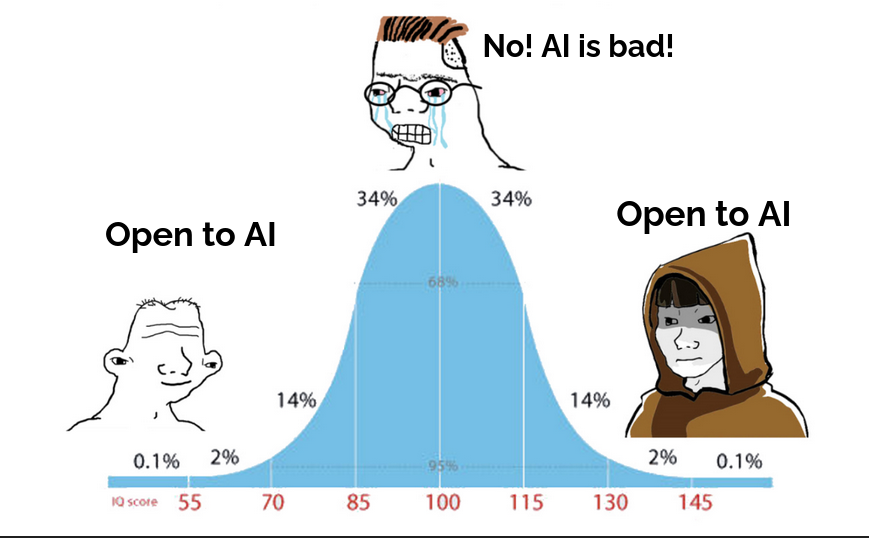The rapid spread of artificial intelligence has people wondering: who’s most likely to embrace AI in their daily lives? Many assume it’s the tech-savvy – those who understand how AI works – who are most eager to adopt it.
Surprisingly, our new research (published in the Journal of Marketing) finds the opposite. People with less knowledge about AI are actually more open to using the technology. We call this difference in adoption propensity the “lower literacy-higher receptivity” link.
I see “smart home” tech the same way.
Here’s an important bit from the actual journal article abstract
This lower literacy-greater receptivity link is not explained by differences in perceptions of AI’s capability, ethicality, or feared impact on humanity. Instead, this link occurs because people with lower AI literacy are more likely to perceive AI as magical and experience feelings of awe in the face of AI’s execution of tasks that seem to require uniquely human attributes.
It then goes on to say you should target ads for AI to people who don’t know anytime about AI, since they’ll see it as magical and buy in. Kinda gross, if you ask me.
It then goes on to say you should target ads for AI to people who don’t know anytime about AI, since they’ll see it as magical and buy in. Kinda gross, if you ask me.
That’s marketing summarized: sell feelings, not facts.
Check most ads for cars, perfumes, airlines, even food. They don’t focus on what they do better, but on how you will feel while using them. Even when they put some actual data here and there, it’s often disguised as part of the “feel better” narrative.
Knowing more about AI makes people less open to having it in their lives
Is it just me? Doesn’t this feel like the more natural way to frame this? There’s something about the title that feels like people are being encouraged to know less about it.
I’d be interested if anyone has insight into the mental/ linguistic mechanics of this.
now that you pointed it out, it feels backwards because you can learn more about a thing, but can’t actively learn less, so “knowing less” reads as reversing a one way proess.
Our studies show this lower literacy-higher receptivity link is strongest for using AI tools in areas people associate with human traits, like providing emotional support or counselling.
This is really dangerous, as subjective matters can easily steer people in vulnerable positions to think and act a certain way. Depending on the training data and safe guards put in place, this could easily lead to AIs telling users to do horrible things to themselves or others.
Interesting. I bet it’s more like this.

Maybe. People with more technical knowledge should understand that LLMs aren’t magic or sentient and have some severe limitations. Hell, I have been tinkering with ML and ANNs for a better part of 15 years or so and they can be extremely useful. (I am no expert and never indend to be.)
It’s the marketing wank, scams, art theft and all the bullshit that pisses me off now. In that regard, I am squarely in the “Fuck AI” category. There is absolutely nothing phenomenal that has come of this recent bubble in the commercial space. AI generated images are mostly trash, articles are riddled with gross factual errors, phishing and other scams are more realistic (and maybe even more dynamic) now and public forums contain even more annoying bots. And the worst bit is that AI generated media, like music, is just a collection of averaged values with no originality.
That bell curve represents something but it isn’t IQ.
My main thing is I hate it being used as a replacement for human creativity. I definitely think it has its uses. I like using DLSS and DLAA in games that support it. For the most part it’s made my gaming experience better. I see its usefulness with generating conversations for NPCs in a game. That’s crazy cool but it needs to be tiptoed around. It shouldn’t be used to replace writers, voice actors or artists.
I signed up for Midjourney a while back to see what all the hoopla is about. As I sat there refining my prompt and regenerating OVER and over and over to hopefully get something that wasn’t all fucked was such a waste of my time and an exponential waste of compute and electricity to generate what is essentially instant garbage. It’s crazy and I felt bad about using it afterwards.
It’s probably that people familiar with the technicals of AI don’t automatically assume it’s LLMs being talked about. There’s several other types being out to very good use, especially in the sciences right now.
Even LLMs have their place as interpretors for those other types. Having natural language interpretation that is fairly accurate the vast majority of the time is a powerful tool with a lot of applications. Near Real time translation or closed captioning is great for accessibility.
One major issue with most online discussion about AI is that many people seem to view that term synonymous with LLMs - which it’s not. LLMs are AI systems but AI as a category is also so much more than that.
Speaking as a researcher in the AI/ML space, you see an interesting divergence at the upper end of familiarity. Some focus on the rapid recent growth of the technology and are quite enthusiastic about it, but others (myself included) focus much more on its limitations, especially driven by the type/quality of the training data used to make the models. I think it comes from different backgrounds prior to learning the tech. Computer science people tend to be in group one, whereas other scientists (biologists, physicists…) that adopt ML as a tool are more likely to be in group two. To be clear, all of this is my personal experience from personal interactions and literature review in graduate school, not some large scale survey.
If the article doesn’t define what “AI” means then the article doesn’t actually mean anything. Market research studying what people know about a vague and undefined term like “AI” can ultimately only produce undefined results.
It’s like asking people their feelings on “woke” or “god”. If everyone is talking about something different then nobody can have more or less understanding of it.
it’s marketing research analyzing human behavior. your comment is wrong and the article certainly has meaning.
Most people don’t care. Even if you tell them what it is about.










